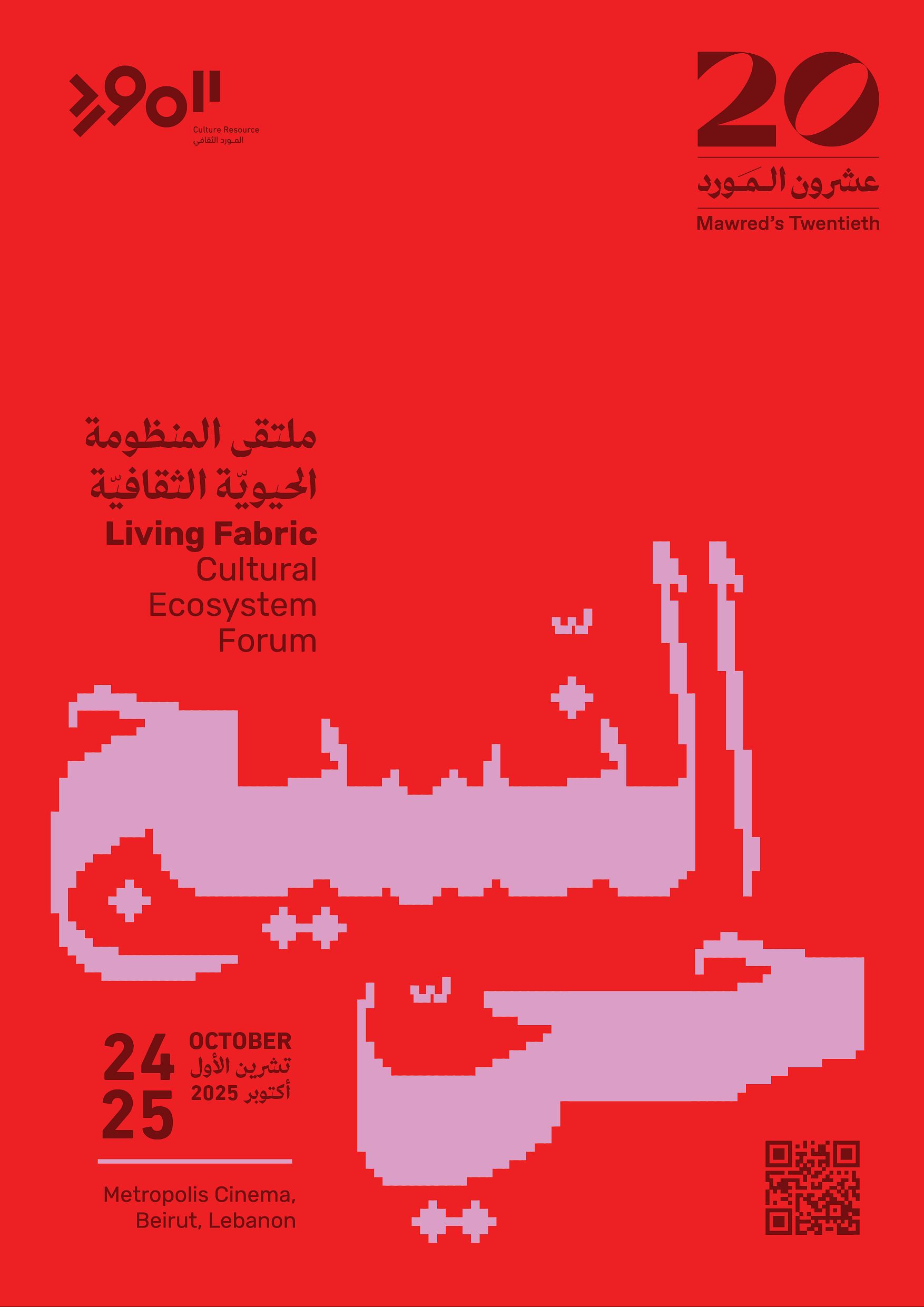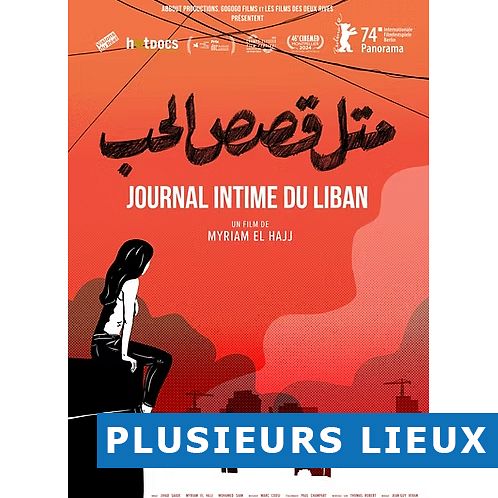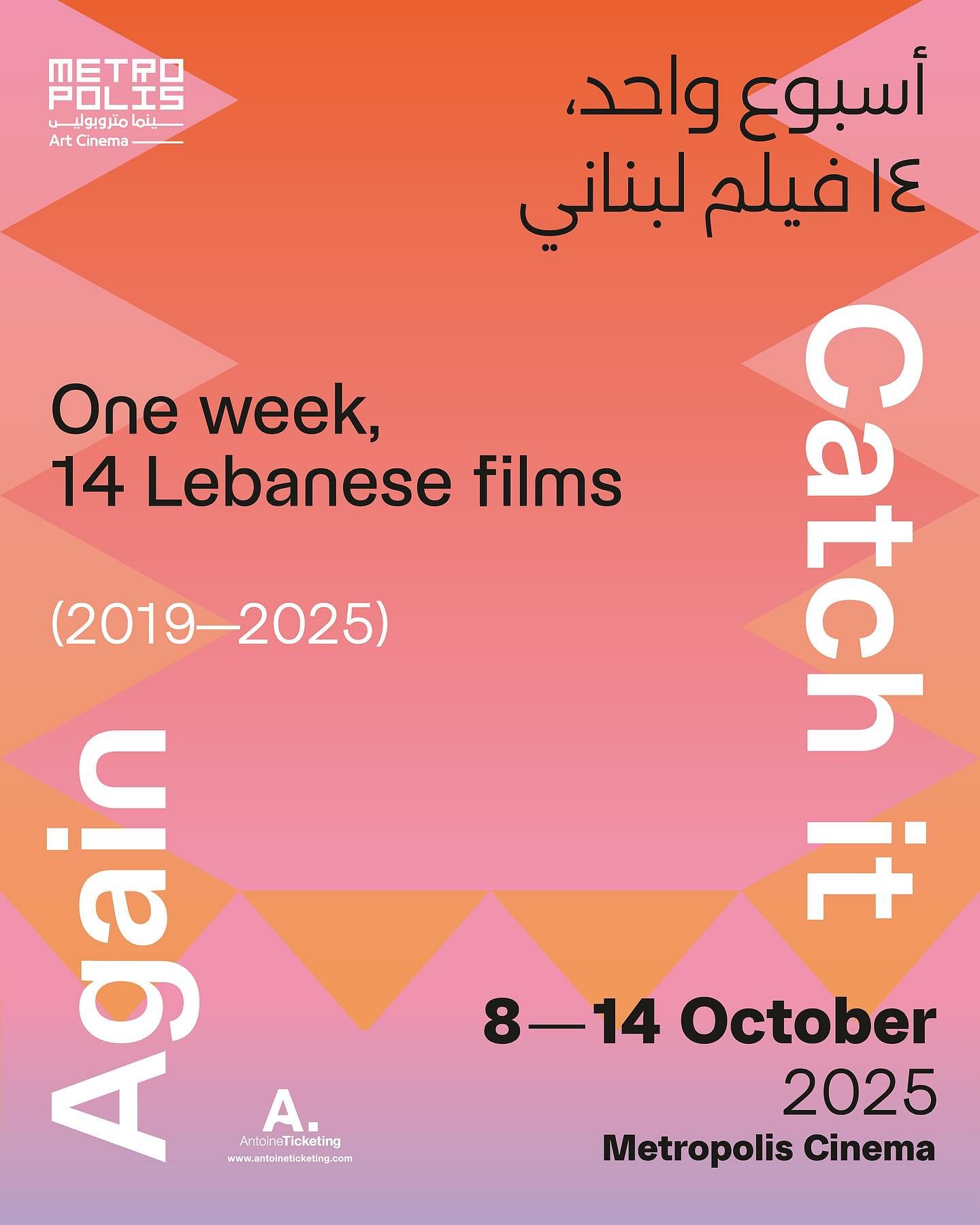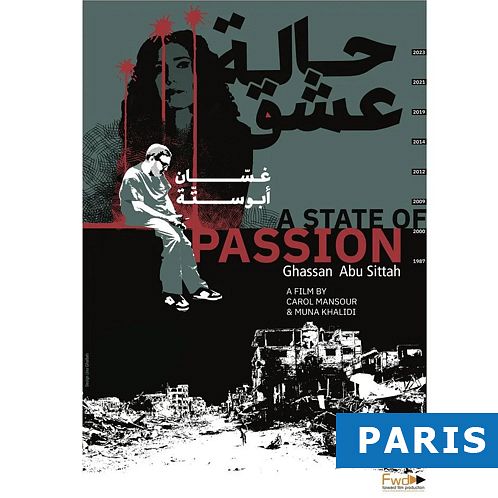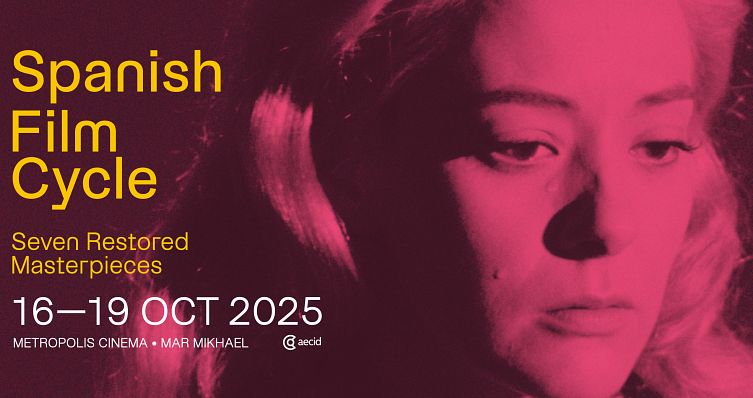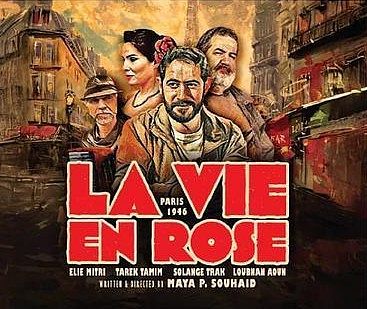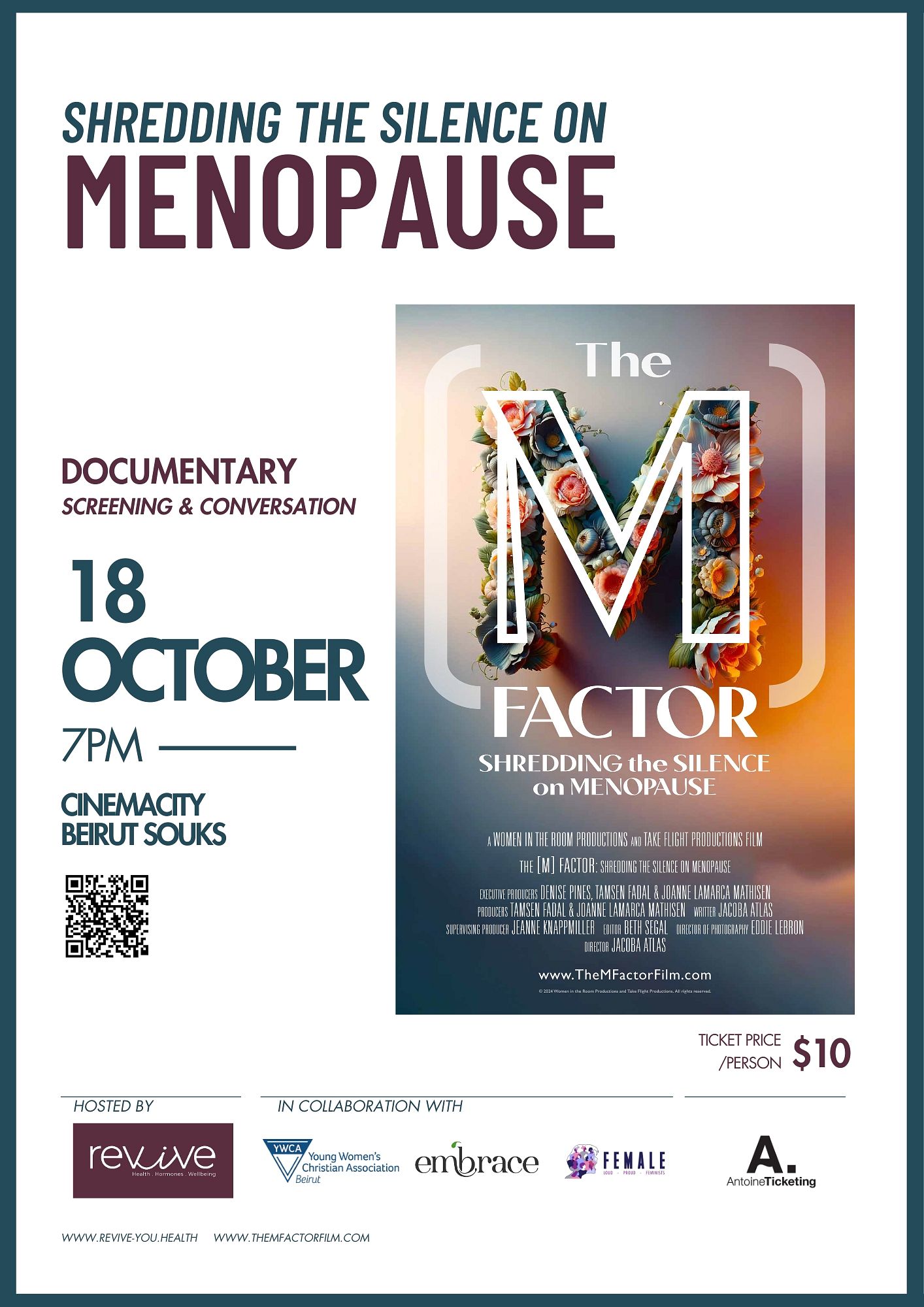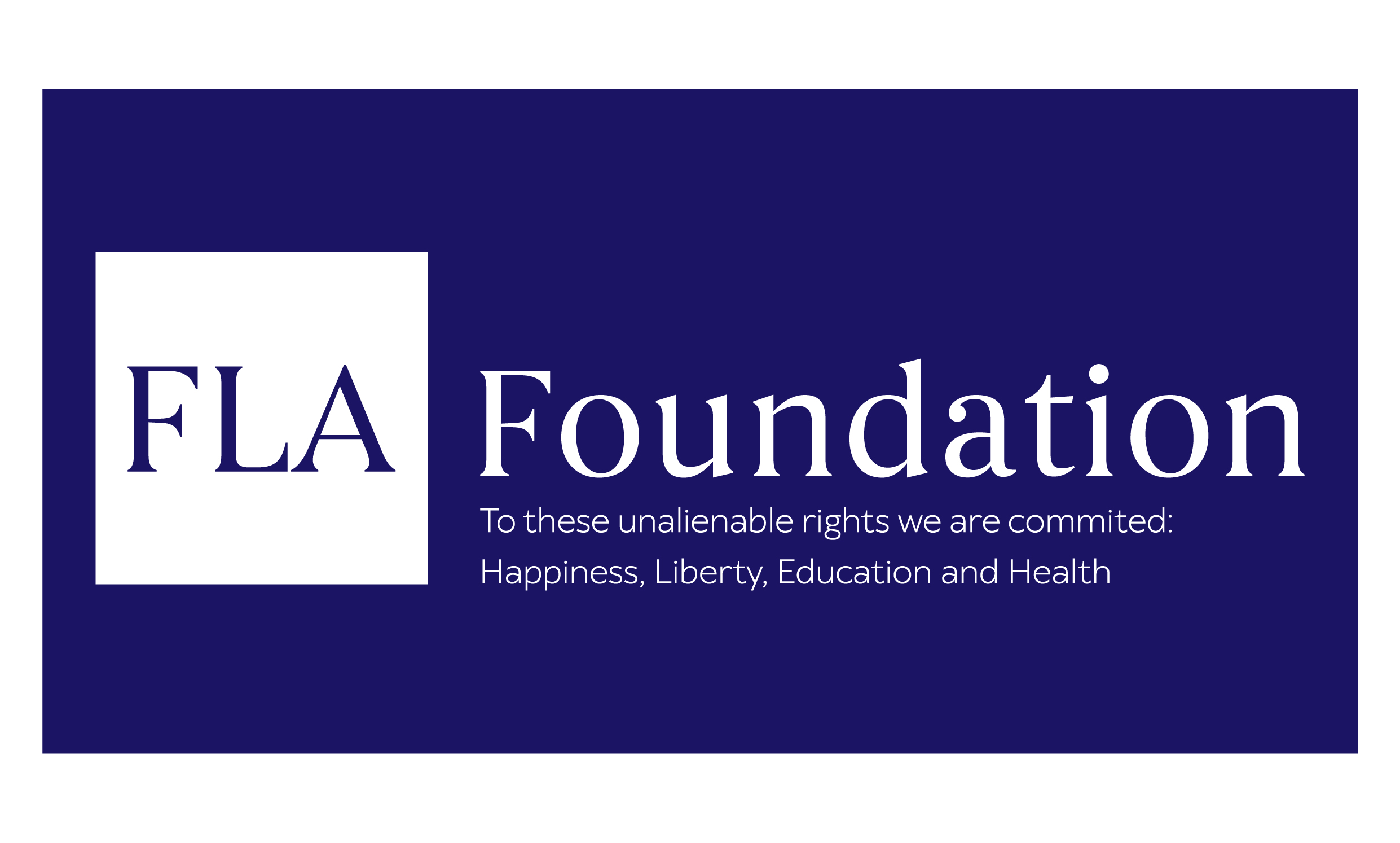LIVING FABRIC : CULTURAL ECOSYSTEM FORUM
CinemaDu 24/10/2025 à 15:00 jusqu'au 25/10/2025 à 22:00
Program Schedule
Friday, 24 October 2025
15:00 - 15:45
Opening Remarks
Cinema 1
MCs: Reem Khattab, Programs Manager at Mawred (Syria) / Yassin Adnan, writer, journalist, and university professor & Member of Mawred’s General Assembly (Morocco)
Speakers: Alma Salem, Director of Mawred - As of November 2025 (Syria/Lebanon/Canada)
/ Helena Nassif, Director of Mawred - September 2017-October 2025 (Lebanon) / Habiba Alaoui, university professor and President of Mawred’s Artistic Board (Algeria)
Screening of Mawred’s 20th film: Twenty Springs and Twenty Survivals (20 minutes)
16:00 - 17:30
The Last 20 Years in the Present and the Future
Roundtable Discussion (Cinema 1)
Over the past two decades, cultural institutions across the Arab region have navigated profound shifts, shaped by political upheavals, wars, economic crises, and evolving forms of governance and suppression. This panel brings together long-standing partners who have been working in the region for 20 years to reflect on these transformations and the ways cultural work has adapted—or struggled—within changing landscapes.
The early 2000s marked a pivotal moment with the increased emergence of cultural institutions, shaping how funding, programming, and institutional structures developed. This discussion will explore the necessity for cultural work to be institutionalized at that moment, as well as the spatial, political and bureaucratic limitations they faced, and the necessity for them to transform/adapt and take on different forms in the face of perpetual precarity. Looking at key historical moments—including the Arab Spring, various revolutions, financial collapses, and ongoing wars of aggression and genocide—the panel will assess where we stand today. What alternatives might be imagined for the future of cultural work in the region? Through critical reflection and shared experiences, this conversation will offer insights into the challenges and possibilities in the present and that lie ahead.
Participants:
Christine Tohme, Founder of Ashkal Alwan (Lebanon)
Jad Abi Khalil, Executive Director of AFLAMUNA (Lebanon)
Laila Hourani, cultural actor (Syria)
Tarek Abou El Fetouh, independent curator (Egypt)
Moderator: Alma Salem, Director of Mawred - As of November 2025 (Syria/Lebanon/Canada)
Respondent: Hanane Hajj Ali, artist, activist, researcher, trainer, and member of Mawred’s General Assembly (Lebanon)
18:00 - 19:30
WORKING IN THE CURRENT POLITICAL CLIMATE
In Conversation (Cinema 1)
This conversation thinks through the significance of cultural work in our region in the current political climate. It contextualizes the ongoing work within a larger movement of collective emancipatory and de-colonial work. The participants discuss audience; who does the work and for whom, the different types of productions and their global resonance and afterlives outside the region, as well as different learned experiences from how this work come together to form a larger movement that we absolutely need to insist on continuing - however small or large it might seem at different times within the geopolitical changes and circumstances.
Participants:
Roger Assaf, theater director, actor, and member of Mawred’s General Assembly (Lebanon) (Lebanon)
Driss Ksikes, writer, playwright, and researcher (Morocco)
Ahdaf Soueif, novelist, political and cultural commentator and member of Mawred’s General Assembly (Egypt)
Habiba Alaoui, university professor and President of Mawred’s Artistic Board (Algeria)
Moderator: Helena Nassif, Director of Mawred - September 2017-October 2025 (Lebanon)
Respondent: Mourad Sakli, musician, composer, and member of Mawred’s General Assembly (Tunisia)
20:00
Music Performance: Beirut Synthesizer Center
Saturday, 25 October 2025
10:00 - 11:30
Panel (Cinema 1)
Through a conversation with Mawred’s long term and new partners, this panel explores guidelines and conventions on applicable ways to reclaim the commons in our region; digitally, materially and conceptually as a tool to pathways of adopting commoning ethos and practices as a way forward.
Taking the commons as a starting point to question how we can build more sustainable futures based on exchange and mutual benefit, the panel asks questions around possibilities for practicing a ‘commons’ approach in our region? What can we learn, salvage and reclaim from our common heritage of commoning? What social frameworks enable/obstruct trials in commoning in the cultural sphere?
Participants:
Abdullah Kafri, Executive Director of Ettijahat - Independent Culture (Syria)
Cathy Khattar, Senior Grants Manager of AFAC (Lebanon)
Fida Touma, Director General of A.M. Qattan Foundation (Palestine)
Helena Nassif, Director of Mawred - September 2017-October 2025 (Lebanon)
Jan Goossens, Co-Artistic Director of Dream City and l’Art Rue (Belgium)
Moderator: Tarek Abou El Fetouh, independent curator (Egypt)
Respondents: Dalia Daoud, Head of Pro Helvetia Cairo (Egypt) / Hosam Althani, writer, cultural manager, and researcher in cultural policy (Libya)
2. Digital and AI Transformations
Roundtable Discussion (Cinema 2)
This panel explores the multifaceted impacts of digital and AI transformations on the cultural sector and opens up a space for discussion of futurities and imaginations. In the past twenty years we have been exposed to several new models of sharing artistic expression online and offline that have allowed artists to break through heavily censored and commodified regulations. Throughout all, we prefaced the important question of how we value artistic labor both for the creators and for the public good. In this session, we will build on the exploratory work of Culture 3.0 grantees in engaging with blockchain technologies, cooperative models, and AI futures: How can creativity emerge under highly surveilled and automated societies? How are artists hacking and confronting the dominant extractivist tech models, especially in Generative AI? What, from the long history of free and open source tech movements in the region, can inform our struggles for free digital expression in the region? What common lexicon can we build between the cultural sector and techies movements to propose new visions for collaborative platforms and digital economies?
Participants:
Haytham Nawar, multidisciplinary artist, designer, scholar, and Founding Director of Cairotronica festival (Egypt)
Majd Al Shihabi, technologist, urban planner, PhD candidate at University of Toronto and Co-founder of MASRAD (Syria/Palestine)
Mohammad Allam, visual artist and Founder of Medrar for Contemporary Art (Egypt)
Ranwa Yehia, Co-founder of the Arab Digital Expression Foundation (ADEF) and Director of ADEF Network (Lebanon/Egypt)
Moderator: Nadine Moawad, feminist researcher and facilitator, active in the open internet and liberation technology movement (Lebanon)
Respondents: Hussein Nakhal, artist, curator, Co-founder & Creative Director of Waraq & Studio Kawakeb (Lebanon) / Sarah Kuhail, PhD candidate at Maastricht University and cultural management consultant (Palestine)
11:00 - 17:15
Radio broadcasting on Radio AlHara organised by Rayya Badran, Writer, editor, and curator (Lebanon) (Cinematheque)
Mawred 20/2025 radio channel, broadcasting live on Radio AlHara will take the radio as a commoning space and how it has evolved specifically over the last 5 years. The program will include interviews with participants from the forum, music interventions, and other forms of auditory proposals in collaboration with various people from Mawred’s network.
ADD SCHEDULE OF RADIO ON WEBSITE - ASKED RAYYA TO PROVIDE THIS
11:30 - 13:00
Long Table (Cinema 1)
This long table discussion critically examines the funding impasse in the region, and notions of refusal within cultural and artistic institutions that have emerged over the past years due to political and economic conditions.
Some of the questions raised will be around proposing existing alternative funding models, refusal to depend on international and state funding that are limiting to artistic productions and that lead to censorship of production or even threat of silencing/erasure (whether local, self or international), conditions and limitations of artists today - after October 7th - both regionally and internationally.
Participants:
Ayman Helmy, composer, music producer, and arts manager (Egypt)
Cyrine Gannoun, expert in management and Cultural Policy, and Director of Alhamra Theatre (Tunisia)
Farah Fayed, Director of Program at AFLAMUNA (Lebanon)
Farah Makki, urban practitioner, researcher, facilitator, and process designer (Lebanon)
Ghassan Halawni, film writer and director, illustrator, painter, animator, and cultural manager (Lebanon)
Hania Mroue, Founder & Director of the Metropolis Association (Lebanon)
Hayder Helo, actor, filmmaker, co-founder & artistic advisor of Baghdad Film Institute (Iraq)
Hisham Jaber, Founder and Artistic Director of Metro Al Madina (Lebanon)
Hosam Althani, writer, cultural manager, and researcher in cultural policies (Libya)
Iman Hamouri, community activist and Director of the Popular Art Centre (Palestine)
Laila Hourani, cultural actor (Syria)
Lena Merhej, university professor, researcher, visual storyteller & Co-founder of Samandal Comics (Lebanon)
Mohammad Allam, visual artist and Founder of Medrar for Contemporary Art (Egypt)
Sarah Kuhail, PhD candidate and cultural management consultant (Palestine)
Facilitator: Fatin Farhat, Researcher in Cultural Policy and member of Mawred’s General Assembly (Palestine)
General provocateur: Ahmed Amine Azouzi, consultant, media entrepreneur, and Director of QLM Media (Tunisia)
Respondents: Rola Kobeissi, cultural manager (Lebanon) / Sandra Edward, cultural manager (Egypt)
2. On Commoning - From Practice to Praxis
Roundtable Discussion (Cinema 2)
How do we practice what we preach in a time of moral erosion and political collapse? What have we learned from earlier modes of instituting and from attempts that faltered or failed? What can praxis make possible in terms of preserving ethical agency when injustice becomes the norm? How can it uphold the right to historicize, to document, and to narrate futures from within devastation? How do we build from what remains, and reimagine without erasure? How can commoning praxis sustain its relation to the public sphere and affirm the political, even as that sphere retracts?
More urgently, how can we conceive of praxis as a living pedagogy rooted in local vocabularies, untethered from populist reduction and unburdened by the need for Western legibility? Praxis is neither safe nor abstract. It is often precarious, exposing individuals to surveillance, silencing, and even exile. Can that vulnerability be reimagined as a form of communicative action across networks of artists, cultural spaces, and collectives who share these conditions and continue to endure?
This panel engages concrete experiences of translating thought into practice and practice into reflection, drawing on the lessons of dismantled alliances and frustrated beginnings. It asks how commoning might offer a space for alternative social and economic contracts, both material and digital, rooted in solidarity, mutual care, and the labor of repair and restoration.
Participants:
Carmel Al Abbasi, visual artist and member of Dahaleez Collective (Palestine)
Hassan Al Nasser, Research Director at The Muse Multi Studios Foundation (Sudan)
Ismail Sheikh Hassan, architect and environmental activist (Lebanon)
Salam Yousry, Artistic Director of The Choir Project (Egypt)
Shurouq Kawarik, financial modernization consultant and Co-founder of Hakuret Al Bireh (Palestine)
Moderator: Yazid Anani, Senior Curator at Hayy Jameel - Jeddah (Palestine)
Respondents: Maha Maamoun, visual artist and curator (Egypt) / Samar Kanafani, Ethnographer, writer, lecturer in sociocultural studies, and research practitioner on the commons (Palestine/Lebanon)
14:30 - 16:00
1. The Politics of Emotion
Roundtable Discussion (Cinema 1)
This panel explores the critical intersections of mental health within cultural and artistic work, particularly in times of political upheaval and economic instability and its relationship to the work that we do as an integral part of civil society and emancipatory liberatory practices. It will examine the personal and collective challenges faced by cultural practitioners, particularly suffered by extremely aggressive conditions - of war and the ongoing genocide on gaza. And it questions how individuals can sustain their work amidst personal and ongoing crises.
Discussions will also address the limitations of cultural organisations and institutional responsibilities in fostering environments that prioritize cultural worker’s conditions - politically and economically. How can organizations better support artists, staff, and practitioners facing grief, burnout, stress, or trauma/war?
By engaging with lived experiences and practical strategies, this panel aims to open a conversation about providing tools and navigating trauma in cultural work while still insisting on the importance of cultural work as a necessity during political and economical crises.
Participants:
Carmel Al Abbasi, visual artist and member of Dahaleez Collective (Palestine)
Ghalia Saab, performer, art and drama therapy consultant (Lebanon)
Khalid Al Baih, political cartoonist, visual artist, writer, and cultural producer (Sudan)
Shaimaa Jamal, Executive Director of Basement Culture Foundation (Yemen)
Moderator: Dinah Ayna, Clinical Psychologist and Faculty Member, Department of Psychiatry, AUBMC (Lebanon)
Respondent: Mahasen Ajam, researcher & consultant specialized in cultural and creative industries, education, telecom, and member of Mawred’s General Assembly (Lebanon)
2. Limits of Language
Roundtable Discussion (Cinema 2)
How do we speak about matters related to cultural production in the Arab region? Who are we speaking to? We note a decreased ability to find new language in the face of rapidly changing realities - what are our losses in knowledge production? What is it that we try to reclaim through language?
This session will take questions around the importance of language in cultural and artistic production and the systems that govern and inform this production. It will also address whether we have or have not been able to make use of language adequately recently - particularly after the start of the genocide in Gaza. What are the different uses of language? Can we think of different forms of language that are able to speak in the face of the increasing atrocities and violence that surround us?
Participants:
· Ahmed Awny, writer, literary editor, and Managing Director of Khan Aljanub publishing house(Egypt)
· Chaima Abidi, Head of film department - Carthage Film Festival (Tunisia)
· Hala Bizri, publisher, researcher, PhD candidate, and Co-founder of Editions Snoubar Beirut (Lebanon)
· Omar Mousa, Journalist and writer (Palestine)
· Ousama Ghanam, Founder & Artistic Director of Damascus Theatre Laboratory and profession of modern theater at the Higher Institute of Dramatic Arts in Damascus (Syria)
Moderator: Sayed Mahmoud, journalist, poet, and and member of Mawred’s General Assembly (Egypt)
Respondents: Boumediene Belkebir, university professor, researcher, novelist and member of Mawred’s General Assembly (Algeria) / Naoures Rouissi, cultural manager, film programmer, curator, and specialist in cultural and creative industries (Tunisia)
16:00 - 17:30
1. Thinking Ecosystems & Sharing Resources
Workshop (Cinema 1)
This workshop explores how to share resources as part of building sustainable ecosystems in cultural and artistic practices. It will explore what we mean by an ecosystem in this context, examining the interconnected networks that sustain cultural work. Participants will be introduced to successful models of resource-sharing, highlighting approaches that have fostered steadfastness and cooperation in these partnerships. It will also critically engage with the limitations of these models, addressing questions of sustainability, accessibility, and scalability. Where do these approaches succeed, and where do they fall short? What external pressures—political, economic, or structural—challenge their long-term effectiveness and how to tackle these issues.
Through open discussion and knowledge exchange, this workshop aims to inspire participants in new ways of thinking about collaboration, sustainability, and shared responsibility in the arts and beyond and create an environment through the workshop where organisations can meet and start thinking of these models in a more tangible way.
Facilitators:
Maha Maamoun, visual artist and curator (Egypt)
Driss Ksikes, writer, playwright, and researcher (Morocco)
Respondent: Ahmad Al Kastawi, Distribution Executive at MAD Solutions (Egypt) / Cindy Mizher, organisational specialist, facilitator, and Co-founder of Khamira Culture (Lebanon)
2. Continuing Through Somatics
Workshop by Taoufiq Izeddiou, Choreographer & pedagogue (Morocco)
(Cinema 2)
This workshop will focus on the importance of movement/the somatic in working through grief, obstacles, unrest, etc.
17:30 - 19:00
Ecosystem Wrap Up
Findings and Analysis (Cinema 1)
Wrap up conversation by inviting respondents and other key participants that might give insights to questions around why we need to continue, and how we do it in our personal capacities and as a collective, or together as an ecosystem. How do we think of futures that are not compromised? What do we take with us, what do we leave behind?
Participants:
Ahmad Al Kastawi, Distribution Executive at MAD Solutions (Egypt)
Boumediene Belkebir, university professor, researcher, novelist and member of Mawred’s General Assembly (Algeria)
Cindy Mizher, organisational specialist, facilitator, and Co-founder of Khamira Culture (Lebanon)
Dalia Daoud, Head of Pro Helvetia Cairo (Egypt)
Hanane Hajj Ali, artist, activist, researcher, trainer, and member of Mawred’s General Assembly (Lebanon)
Hosam Althani, writer, cultural manager, and researcher in cultural policy (Libya)
Hussein Nakhal, artist, curator, Co-founder & Creative Director of Waraq & Studio Kawakeb (Lebanon)
Maha Maamoun, visual artist and curator (Egypt)
Mahasen Ajam, sculptor and architect and member of Mawred’s General Assembly (Lebanon)
Mourad Sakli, musician, composer, and member of Mawred’s General Assembly (Tunisia)
Naoures Rouissi, cultural manager, film programmer, curator, and specialist in cultural and creative industries (Tunisia)
Rola Kobeissi, Managing Director (Lebanon)
Sandra Edward, cultural manager (Egypt)
Samar Kanafani, Ethnographer, writer, lecturer in sociocultural studies, and research practitioner on the commons (Palestine/Lebanon)
Sarah Kuhail, PhD candidate and cultural management consultant (Palestine)
Moderator: Colette Saba, researcher and expert in cultural and heritage policy strategies in the Arab region (Lebanon)
Respondents: Amina Mourid, urban planner & Co-founder of Think Tanger (Morocco) / Hicham Bouzid, Co-founder and Artistic Director of Think Tanger (Morocco)
22:00
Music Performances at Metro Al Madina
Milaha: Dina El Wedidi (Egypt), Maya Al Khaldi (Palestine) & Youmna Saba (Lebanon)
SILK: Khaled Omran (Syria) & Romy Melhem (Lebanon)
Wael Elkak (Syria)
Other Contributions
VR Installations:
Fragmented Fantasy, Ahmed Nader
Sketch for a collective dream experience, Malak Yacout
Circles, Sara Ayman
Organised by Medrar for Contemporary Art (Egypt)
Illustrators:
Khalid Al Baih, political cartoonist, visual artist, writer, and cultural producer (Sudan)
Lena Merhej, university professor, researcher, visual storyteller & Co-founder of Samandal Comics (Lebanon)
Magazine Publishing:
Amina Mourid, urban planner & Co-founder of Think Tanger (Morocco)
Hicham Bouzid, Co-founder and Artistic Director of Think Tanger (Morocco)
Marking the 20th anniversary of Culture Resource (Al-Mawred Al-Thaqafy), Living Fabric: Cultural Ecosystem Forum comes together to weave the intricate threads of what has become a large network of partners across the Arab region working in artistic, literary and cultural productions in general. Threads that are perpetually vulnerable or at risk due to the region’s ever increasingly perilous political and economic conditions.
Over the course of two days, the program returns to some of Mawred’s main strategic directions to reground its mission and past work in the present, in order to lay the ground for how to be better prepared in our planning amidst rapidly and continuously changing political, economic and professional conditions. The program is informed by the intersections of technology, human rights, education and the environment through initiatives that have been launched by Mawred over the last five years; namely; Culture 3.0, Reclaiming Our Commons (Mawred’s 20th anniversary open call) and the Ecosystem Strengthening Pilot program. At the core of it, it asks the question of how to build and sustain ecosystems of support that are responsive yet generative, by giving space to intergenerational dialogue from across the Arab region, and re-visiting the social and political role and responsibility of cultural work across the region amidst extreme violence and rising fascism.
The forum starts with reflecting on the early 2000s, into the Arab Spring and more recent revolutions, wars and the genocide on Gaza as pivotal moments for the region, and asks how to reclaim a commons that can be actively practiced. It examines the language that we use, funding models, censorship and the limits of refusal. The program also features practical workshops that introduce tools and models for resource sharing, techniques for critically engaging with AI and digital transformations, and strategies for sustaining both personal practice and broader civic engagement.
If the Genocide on Gaza and the wars on the region are teaching us anything, it’s to insist on the importance of coming together to discuss, think, move, and reset. It has also been indicative of the importance of the work that we do to counter the historical and contemporary systemic strategies of erasure by the zionists and their allies, through attacks on not only human lives but also built environment, heritage, identity, language and archives. The program hopes to be a reminder of the urgent need to reclaim our collective agency, and to believe and trust the work that we do as a pillar for a growing vital ecosystem we would like to be a part of. Through discussions, workshops, panels, and a radio program, we come together - both longstanding and new collaborators - to consider our present moment and all its urgencies and particularities. In doing that, we hope to collectively and sensitively assess what we need to return to, what should be left behind in models and habits, and what new tools and approaches are needed to sustain a human-centred future.
Curators: Reem Shadid and Roy Dib
LieuMetropolis
ÉVÉNEMENTS SIMILAIRES
